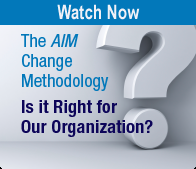Every change management methodology includes some type of toolkit. Our proprietary Accelerating Implementation Methodology (AIM) is no exception. It offers a multitude of tools including assessments, forecasts and templates, because there's no question… checklists, templates, and surveys all have a place, and each has value for change management practitioners. But some change management methodologies stop there. They are primarily driven by a set of checklists, templates and tools for Change Agents “to do”—in other words, they are activity based. 
As experts in the change management industry, we know change is never black and white. It is never “one and done” when it comes to critical success factors like Sponsorship. There is always a lot of ambiguity and human emotion that we believe will never be uncovered or managed just with the use of tools! Change is cyclical and iterative. That is why we always tell people in our change management training programs that change management is just not a “check the box” activity!
“Tools" are only that… tools. No matter how deep or robust a toolkit is, it is not going to be sufficient to address the primary requirements for change management success… identifying the behaviors you are seeking in the future state, and driving the behavior change!
Securing Sponsorship Has the Most Impact
Even in today's technology-driven world, people are still people. They want to have connections to their work and to their colleagues. They want to feel valued. They want to feel that leaders have listened to them and that expectations are clear. Tools alone won't make any of this happen. In fact, the most important relationship for driving behavior change is between a manager and his or her direct reports. It has nothing to do with tools and templates.
Change Agents have to have the courage to do the very hard work of influencing the leaders and managers of everyone who is impacted by the change. Effective Change Agents can’t “hide” behind a set of tools. They really need to be out "in the field" contracting with both the Authorizing and Reinforcing Sponsors at each level to get them to do the requisite Expressing, Modeling and Reinforcing for the behaviors the Sponsors see every day with their own people. It is not about spending the majority of Agent time completing a set of checklists and templates.
Yet more and more we are asked about how many tools are included in AIM, and we get the distinct sense that the number of tools is often the deciding factor in selecting a change management methodology. Quite frankly, that's missing the point of what a change management methodology should be all about. Instead, here are 10 better and much more relevant questions to ask when comparison shopping for a change management process:
Ten Questions to Consider
- How flexible is the change management methodology? Can you scale so you can use the methodology on both business as usual projects and on transformational change?
- Is the methodology operationally-focused? In other words, is it highly conceptual or is it operational with attention paid to what people need to do in whatever situation they find themselves in?
- Does the methodology fit with the types of people we have in our organization? For example, if your organization is highly analytical, is the methodology structured and systematic?
- What kind on-going support is included with the change management methodology? Are there opportunities for continuous learning?
- Is this methodology primarily focused on the "individual journey" or is it focused on implementation of organizational changes?
- Does the change management methodology include a full suite of learning programs that will bring the methodology to life for all levels of the organization from executives to front-line employees?
- How easily can the methodology be integrated into project management work breakdown structures or other business protocols like Lean/Six Sigma?
- Can the methodology be presented in a user-friendly way that will appeal to the business so that it is understood and embraced by all? Or is owned by a small selected group?
- Do the tools integrate into the other elements of the methodology as a support to all the other work being done?
- Is the methodology both strategic and tactical and does it enable the organization to mitigate risks on the human-side?
Time is a precious commodity, especially in today's workplace. Every organization is trying to do too much, with constrained resources. Given this reality, where should your Change Agents focus their attention? Should they be in their offices filling out checklists, or should they be out in the organization uncovering resistance, developing Sponsorship, and creating the type of communications that are specifically suited for the audience?
Remember the goal of “change management,” shouldn’t be "to do" a process, but rather to have core principles guide you on what you should be doing, given the day-to day project realities and challenges. Big, hard changes require more than a set of tools, templates and/or checklists to support the human side of the implementation {Tweet This}! That's why a change management methodology like AIM that is structured on the fundamental principles that drive behavior change is much more effective than any collection of tools and templates.


